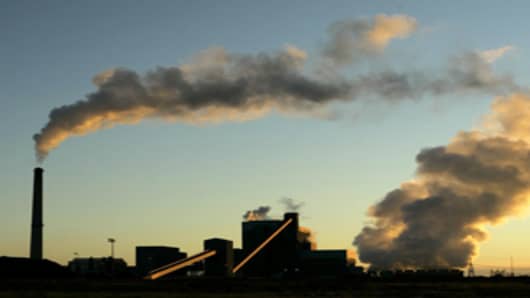The battle over the future of coal is burning hot in Kansas.
Governor Kathleen Sebelius and the legislature are locked in what appears to be both a local power struggle and a broad environemntal debate with important ramifications for the nation.
Twice this year, Sebelius has vetoed legislation that would have cleared the way for two large coal power plants, on the unprecedented grounds of environmental harm from carbon dioxide.
The latest veto came April 17, one day after President George Bush announced support for curbs on greenhouse gases, a significant shift in administration policy, which Sebelius cited in her decision.
The fierce struggle over the $3.6 billion project has drawn national attention because it is seen as a proxy contest over the future role of coal in providing electricity in an age of climate change.
Neither side shows signs off backing away from the fight, which has drawn in major industry players, pitting coal interests, represented by Peabody, the worlds's largest coal firm, against gas, an alternative fuel, particularly Chesapeake Energy, the US' third largest gas producer, which has paid for lobbying against the coal plants.
The second bill passed with a wide majority, just one vote shy of being able to override the governor’s veto, which seems to set the stage for more skirmishes.
“This is on-going, this is definitely not a done deal – nobody is giving up on either side,” said Nicole Corcoran, the governor’s spokesperson.
“We are going to continue our battle here in that we are still firmly convinced that our coal project is by far and away the lowest cost option for our consumers and so until the last gravel sounds we are going to continue fighting fiercely for that,” says Steve Miller, a spokesman for Sunflower Electric Co-operative which has proposed the projects.
Sunflower, which operates in central and western Kansas, wants to building two 700-megawatt power plants, but last October had its air permit application rejected by the state’s Department of Health and Environment.
In its decision the department cited the landmark ruling last April by the Supreme Court that carbon dioxide was a pollutant that could be regulated under the Clean Air Act.
Supporters of the coal plants complain that there are no current federal standards on greenhouse gases. The bill passed by the Kansas legislature would have stripped the state of authority to deny permits for projects that meet current federal standards.
Although some three dozen states have adopted climate change measures, Kansas is the first to block a coal plant explicitly because of greenhouse gases, which are blamed for causing global warming.
Another key issue is that 80 percent of the power generated from the two plans is destined for other states – Nebraska, Colorado, New Mexico and Wyoming. Still, Sunflower says it needs the economies of scale to make the project viable.
But Governor Sebelius has objected to saddling the state with additional air pollution, including 11 million tons of carbon dioxide annually from the two new plants.
In making her decision, Sebelius noted that President Bush had “recognized that the power sector must make significant efforts to achieve” a new national goal of reducing greenhouse gases. Draft bills with specific targets are making progress in the Senate.
"It would be unfair to Kansas, for our utilities to build coal fired plants for other states until we can evaluate the costs of those plants for Kansas taxpayers and rate payers,” added the governor.
But Sunflower insists that based on price coal is easily the best choice, and that the next lowest cost option - some combination of wind and gas – would raise retail power costs 60 percent.
Corcoran said the governor is not ideologically opposed to coal and noted that she had suggested a compromise for Sunflower to build a smaller single plant of 660 MW.
But the compromise proposal came with other conditions for renewable energy and energy efficiency targets and for using more expensive gasification technology Sunflower said is still not viable.
“She is not saying no coal ever because realistically that’s probably not going to happen at this point in time,” said Ms Corcoran.
Miller said the second bill was a “lot greener” than the first but the governor was dismissive and displayed mounting annoyance with legislators.
She complained that the new bill "did "nothing to address the issues at hand – developing comprehensive energy policy, providing base-load energy power for Western Kansas, implementing carbon mitigation strategies and capitalizing on our incredible assets for additional wind power.”
“We must remember the decisions we make today have a huge impact on Kansans for generations to come," she concluded.


